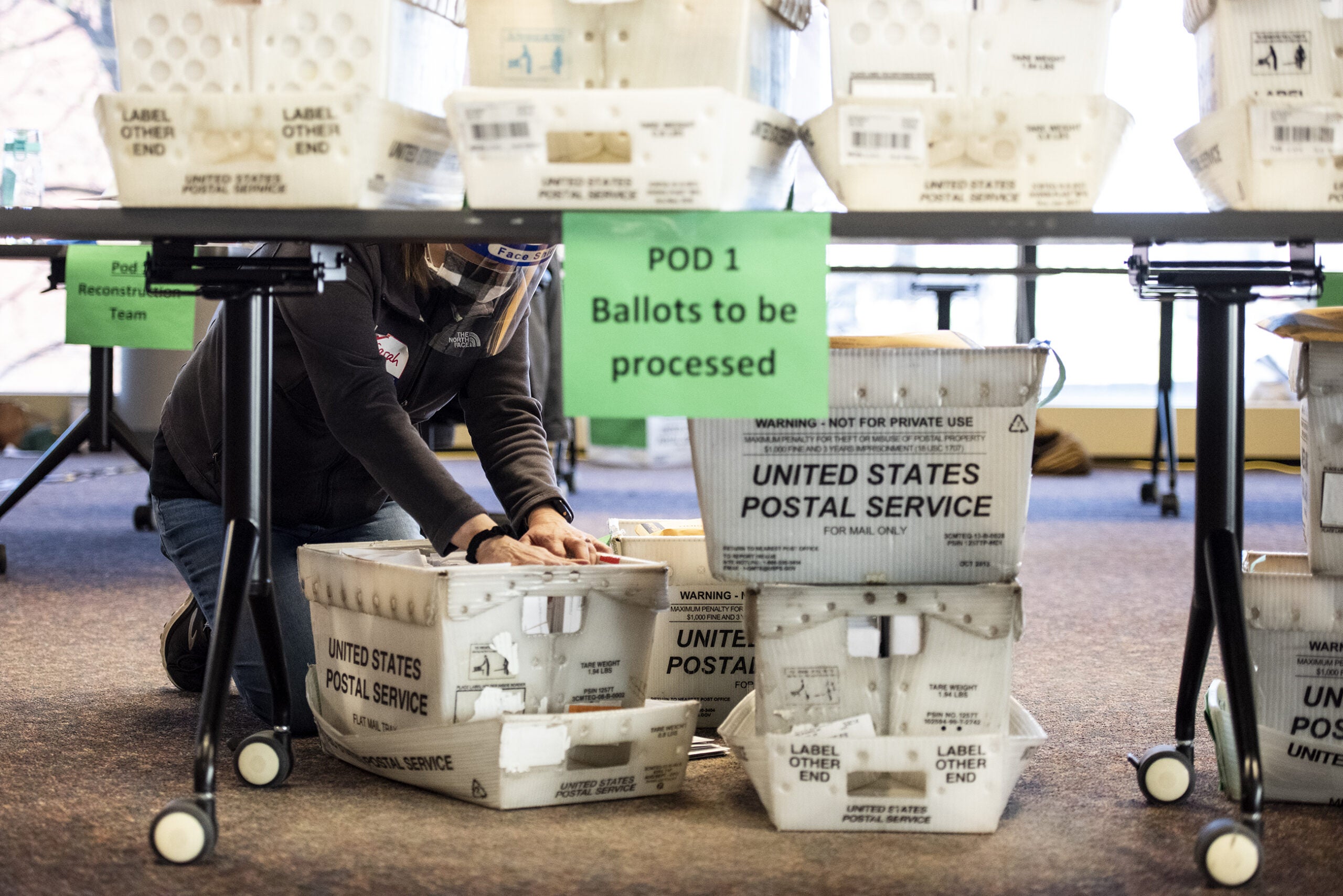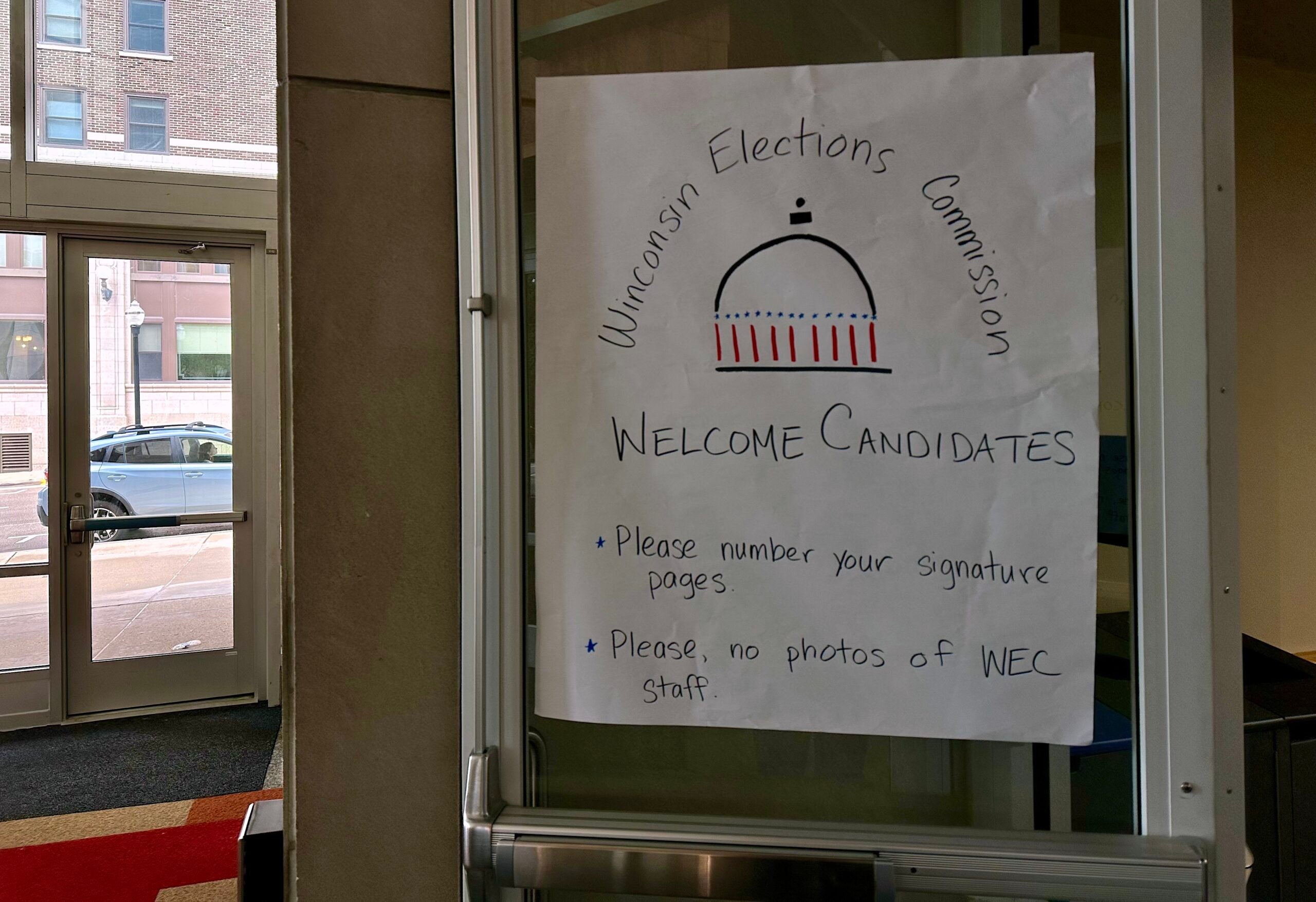Two lawsuits that could affect how tens of thousands of Wisconsinites vote in this November’s election had oral arguments before the Wisconsin Supreme Court on Tuesday.
The cases, both brought by conservatives, highlight disagreements over how election laws related to voter rolls and housebound voters should be interpreted and enforced in the state.
The first case, brought by the conservative Wisconsin Institute for Law and Liberty, could result in about 130,000 people being removed from voter rolls in Wisconsin. The group argues the Wisconsin Elections Commission hasn’t properly maintained Wisconsin’s list of registered voters by waiting too long to remove people who may have moved within Wisconsin or out of state.
Stay informed on the latest news
Sign up for WPR’s email newsletter.
The second case, brought by the Republican Party of Wisconsin, is asking the court to provide guidance on who needs to include a copy of a photo ID with their mail-in ballot. The lawsuit stems from guidance Dane County Clerk Scott McDonell provided to voters ahead of the April presidential primary.
‘Voter Purge’ Case Hinges On State, Local Authority Dispute
Arguments in the case that could purge names from Wisconsin voter rolls focused on who is bound by state law to maintain and update the list.
The conservative group that brought the case argues voter roll updates are the responsibility of the Wisconsin Elections Commission and that the commission has been missing state-imposed deadlines.
But Attorney General Josh Kaul, who represented the commission in oral arguments, asserted voter roll maintenance falls largely to local election officials across the state.
“It’s the state’s duty to maintain the list, so the (Wisconsin Elections Commission) has to perform the technical functions … but the actual nuts and bolts of how people are registered or how they’re deactivated, under our system, that largely happens at the local clerk level,” Kaul argued.
Kaul also called into question the reliability of the list conservatives want the Wisconsin Elections Commission to use to remove voters from the rolls.
In 2017, purging voters identified by the list resulted in about 46,000 people being removed from voter rolls even though they hadn’t moved within Wisconsin or out of state, according to the state Elections Commission.
Rick Esenberg, who argued on behalf of WILL, argued the list should be considered trustworthy because the percentage of deactivated voters is small compared to the total number of registered voters in Wisconsin.
“That is, I think, as a matter of law, a reliable list,” Esenberg said. “(The Wisconsin Elections Commission’s) problem is the list isn’t perfect, and they don’t want to deal with that.”
WILL brought the case in November, contending the commission is required to remove people from the state’s voter rolls if they don’t respond to a so-called “movers mailing” within 30 days. Commission policy currently allows voters to stay on official rolls for up to two years after the mailing is sent.
The mailing goes to people flagged as potentially having moved in Wisconsin or out of state by the Electronic Registration Information Center, a nonprofit, multi-state group that helps member states keep their voter registration lists current. ERIC identifies individuals who may have changed addresses after they file official government paperwork with a new address, like a vehicle registration or change of address form.
After receiving a notification from ERIC, the commission sends a postcard to the address where the potential mover is registered to vote and asks them to confirm whether they still live there.
The commission sent the mailer to about 232,000 people in October. Since then, many have confirmed they still reside at their address or have registered at a new address in Wisconsin. According to the commission, there were about 129,000 people who had not done either as of mid-May.
Those individuals would be removed from the rolls if the Supreme Court sides with WILL in the case.
Though some don’t expect the court to rule before the Nov. 3 election, it is possible.
Conservative Justice Brian Hagedorn could provide a swing vote in the case, as he did recently in a case that denied the Green Party access to the presidential ballot in Wisconsin.
During arguments, Hagedorn questioned why the state Elections Commission had the authority to remove voters from the registration list in 2017 and adopt the two-year policy in 2019, if the list maintenance responsibility does instead fall to local officials.
“It’s one of the questions that perplexed me in this case, reading through it, is what authority the commission thought it had to do what it did in 2017,” he said.
GOP Calls For Clarity On Mail-In Ballot Requirement
In arguments for the second case, a lawyer for the Republican Party of Wisconsin urged justices to provide guidance on the definition of “indefinitely confined” voters in Wisconsin, a group of people who can bypass the state’s voter ID law when casting ballots by mail.
In April, Dane County Clerk Scott McDonell told voters who were housebound because of the COVID-19 pandemic they could indicate they are “indefinitely confined” when filling out an online form to request a mail-in ballot.
After indicating they are confined, voters are allowed to bypass a normal absentee ballot application requirement: uploading a copy of a valid ID for voting, like a driver’s license.
At the time, McDonell said his office had been “inundated” with calls from voters, particularly older people, who have had trouble uploading a photo of their ID with the application.
Republicans took issue with McDonell’s guidance, saying he was encouraging people to inappropriately skirt the voter ID law.
During Tuesday’s arguments, GOP attorney Eric McLeod said the court needed to provide concrete guidance about who qualifies as “indefinitely confined,” so election results aren’t challenged later this year.
“We’re in a very difficult time right now, and guidance and clarity provided by this court could be critical to the outcome of some future election,” McLeod said.
Lawyers for the Dane County clerk acknowledged his guidance in April was incorrect, but said there is no proof a single voter misclassified themselves because of it.
“This case is a show … there are no facts here,” said Dane County lawyer David Gault.
According to the Wisconsin Elections Commission, about 200,000 people indicated they were “indefinitely confined” for April’s presidential primary, a large increase from about 72,000 who identified that way for elections in 2019.
Wisconsin Public Radio, © Copyright 2025, Board of Regents of the University of Wisconsin System and Wisconsin Educational Communications Board.





